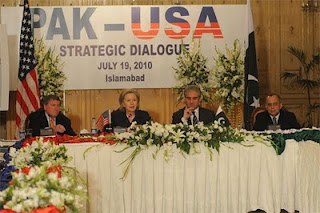-
In Pakistan, Clinton Calls for Human Security; USAID’s Shah Commends Birth Spacing
July 20, 2010 By Russell Sticklor In Islamabad yesterday, Secretary of State Hillary Clinton acknowledged longstanding Pakistani concerns that the U.S.’s ongoing mission in the country is solely military in nature. However, Clinton asserted at the opening of the second U.S.-Pakistan Strategic Dialogue that the “future demands a comprehensive human security, a security based on the day-to-day essentials like jobs, schools, clinics, food, water, fuel, equal access to justice, [and] strong, accountable public institutions.” To that end, she announced a $500 million assistance package earmarked largely for new agricultural and hydroelectric infrastructure development, as well as the construction of new hospitals and other health infrastructure.
In Islamabad yesterday, Secretary of State Hillary Clinton acknowledged longstanding Pakistani concerns that the U.S.’s ongoing mission in the country is solely military in nature. However, Clinton asserted at the opening of the second U.S.-Pakistan Strategic Dialogue that the “future demands a comprehensive human security, a security based on the day-to-day essentials like jobs, schools, clinics, food, water, fuel, equal access to justice, [and] strong, accountable public institutions.” To that end, she announced a $500 million assistance package earmarked largely for new agricultural and hydroelectric infrastructure development, as well as the construction of new hospitals and other health infrastructure.
Family planning was another key element in this week’s U.S-Pakistani talks. A U.S. delegation headed by USAID Administrator Rajiv Shah met with top Pakistani health officials to discuss the strategic importance of birth spacing. Both sides agreed that encouraging women to extend the interval between bearing children would not only improve maternal and child health, but also start to bring Pakistani’s population growth rate down to a more sustainable level—a goal fully explored at a recent Wilson Center conference on Pakistan’s population challenge.
As Pakistani demographer Zeba Sathar told New Security Beat in an interview at the conference, educating young women and empowering them to control their own reproductive health will allow them to “take care of their fertility and their family size themselves”—a development that could ease Pakistan’s resource crunch and reduce traditional gender inequities in the years to come.
Sources: Daily Times (Pakistan), International Business Times (U.K.), Los Angeles Times, Times of India, U.S. Agency for International Development.
Photo Credit: “Secretary Clinton Travels to Pakistan,” courtesy of the State Department.Topics: agriculture, demography, development, energy, family planning, foreign policy, gender, global health, Pakistan, South Asia
 A Publication of the Stimson Center.
A Publication of the Stimson Center.



